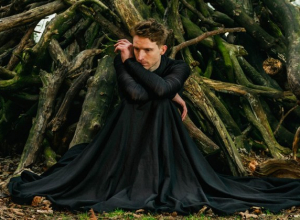Romantic films: From the most romantic to the cheesiest
By Lenny Barksdale in Movies / TV / Theatre on 15 September 2021
From universal dating truths to slapstick British rom-coms; from classic musicals to extreme tear-jerkers. What is your preference on the scale from romance to cheese-ball?
In the same way that we differ genetically from every other person on the planet – even our very own twin, if we have one – so too do we differ in terms of the entertaining theme, or genre, that is most likely to keep us riveted to the screen when we settle down to watch a movie.
 Picture credit: Pixabay
Picture credit: Pixabay
If romance is your movie-watching genre of choice, you’ll love Empire’s countdown of the 60 best romantic movies of all time – especially as they acknowledge that “love comes in all shapes and sizes”. Below, we dip into three of the most popular romance flicks, the reasons for their popularity, and the actors who either sweep us off our feet or muddle through and make us laugh (often because we’ve experienced the same in the dating game before).
Ranking up there as a golden oldie must surely be When Harry Met Sally (1989), with Billy Crystal as Harry Burns and Meg Ryan as Sally Albright. Directed by Rob Reiner and with an original script by Nora Ephron, the protagonists meet when Sally offers Harry a ride to New York after they both graduate from the University of Chicago. The film captures snapshots of their lives and, ironically, reveals a close friendship developing – despite Harry claiming, right upfront, that “No man can be friends with a woman he finds attractive. He always wants to have sex with her.” Not seen it yet? What rock have you been hiding under! When you do watch, don’t miss the deli scene in which all the other women in the place want “what she’s having”!
If British humour floats your boat, next up must surely be Four Weddings and a Funeral (1994), with Hugh Grant as Charles and Andie MacDowell as Carrie. Directed by Mike Newell and written by Richard Curtis, this film which was made in just six weeks and cost under US$3 million became – quite unexpectedly – the highest grossing British movie in history (at the time). It’s wedding fever among Charles’ mates and you’ll love the way in which he and bubbly roommate Scarlet are always late, or forget the ring. But, like in When Harry Met Sally, the serious underlying theme involves Charles’ serial monogamy and inability to let anyone get too close – until he agrees to walk down the aisle with an ex, Henrietta, only to find he’s head over heels in love with Carrie.
As per the famous William Shakespeare line from A Midsummer Night's Dream, “The course of true love never did run smooth”. And nothing could be more true than the plot of Canadian tear-jerker The Notebook (2004). Directed (and written) by Nick Cassavetes, 1940s mill worker Noah Calhoun (Ryan Gosling) and rich girl Allie Hamilton (Rachel McAdams) have a teen love affair that seems doomed when Noah heads off to serve in World War II. While this suits Allie’s well-to-do parents, it by no means signals the end of the connection between Noah and Allie. Watch with caution – and a huge box of tissues – especially if you have a loved one suffering from Alzheimer’s or any other form of dementia.
We’ve seen that the above movies are much-remembered for their cuteness, hilarity, relatability and drama; so what makes a movie into a complete cheeseball? Could it be the way the actors break into song at odd moments, the way we know everything will turn out perfectly in the end, or any kind of recurring theme that delights in its silliness?
Top of this list must surely be Grease (1978), starring John Travolta as Danny Zuko and Olivia Newton-John as Sandy Olsson, in a musical romance directed by Randal Kleiser. Danny and Sandy fall in love one summer, and then must face each other at the same high school next season... That’s the rather charming plot in a nutshell. However, this film boasts no less than 12 hit songs – mostly ported over from the 50s Broadway original – including: Grease, Summer Nights, Look at Me, I’m Sandra Dee, Hopelessly Devoted to You, Greased Lightnin’, Beauty School Dropout, Born to Hand Jive, Sandy, There Are Worse Things I Could Do, Look at Me, I’m Sandra Dee (Reprise), You’re the One That I Want, We Go Together, and Grease (Reprise). Bet you’ll be downloading the soundtrack for your next roadtrip or marathon race.
As for Mamma Mia (2008), directed by Phyllida Lloyd, you’ll likely be torn between the “infectious joy” of the Abba-inspired soundtrack and gorgeous Greek-island setting of this big-screen adaptation, and the extremely corny way in which Meryl Streep’s Donna Sheridan, the mom to Amanda Seyfried’s Sophie, breaks into song at the drop of a wine glass. Many argue it works better on stage in the actual musical. Who is Sophie’s father? Does it matter which one of her mother’s ex boyfriends it could be, when they all rock up (secretly invited by Sophie) for her wedding? If a cornball is your thing, screen this at your own bachelorette party – or the sequel, Mamma Mia! Here We Go Again (2018) at your best mate’s kitchen tea. These two flicks are a giggle a minute – plus, the sequel stars special guest Cher as Sophie’s grandmother, Ruby Sheridan.
Next up, on my list, is Charles Shyer’s Father of the Bride (1991), based on the 1950s film of the same name, revealing how very tough it can be for a loving father to give away his darling, intelligent daughter – especially, in this case, when she’s only 22 and freshly graduated from college. Steve Martin gets into hot water as Annie’s father, successful sport shoe exec George Banks; Diane Keaton plays the understanding and supportive mom, Nina Banks; while other key players aside from the bride (Kimberley Williams as Annie Banks-MacKenzie) and groom (George Newbern as Bryan MacKenzie), are the hysterical wedding coordinator Franck Eggelhoffer (Martin Short) and his catering buddy Hanck (David Pasquesi). The extent to which George gets smothered in exorbitant wedding preparations is par for the course... But you just know, if things haven’t turned out perfectly just yet, it’s not quite the end.
Returning to our genes, some scientists argue that our behaviors and preferences – such as the movie or gaming genres we find most entertaining – are “profoundly influenced by our genetic makeup”. Use that argument the next time you need to fight for your right to wield the remote.
Contactmusic
Suggested

Leisure Festival - Dreamland in Margate
On the same day that Glastonbury welcomed back Margate's adopted sons, The Libertines, Margate itself put on it's very own Leisure Festival as it...

Pretty Fierce talk to us about collaborating with Doja Cat, emetophobia, arena tours and staying "true to yourself" [EXCLUSIVE]
Sheffield's very own all girl group Pretty Fierce are still on a high after the recent release of their debut single - 'Ready For Me'.

Will Varley & Jack Valero - The Astor Theatre Deal Live Review
Three nights before the end of his current tour Will Varley returned to his home town of Deal to delight a sold out crowd in The Astor Theatre.

WYSE talks to us about her "form of synaesthesia", collaborating with Radiohead's Thom York and the prospect of touring with a band [EXCLUSIVE]
With only a few days to go before Portsmouth based songstress and producer WYSE releases her new single, 'Belladonna', we caught up with her to find...
Advertisement

Bay Bryan talks to us about being a "wee queer ginger", singing with Laura Marling and being inspired by Matilda [EXCLUSIVE]
Colorado raised, Glasgow educated and Manchester based Bay Bryan is nothing if not a multi-talented, multi-faceted artist performing as both...

Keelan X talks to us about staying true to "your creative vision", collaborating with Giorgio Moroder and being "a yoga nut" [EXCLUSIVE]
Former Marigolds band member Keelan Cunningham has rediscovered his love of music with his new solo project Keelan X.
![Luke De-Sciscio talks to us about having the courage to be yourself, forgiving that which is outside of one's control and following whims [EXCLUSIVE] Luke De-Sciscio talks to us about having the courage to be yourself, forgiving that which is outside of one's control and following whims [EXCLUSIVE]](https://images.contactmusic.com/images/home/homepage/luke-de-sciscio-abof-a.jpg)
Luke De-Sciscio talks to us about having the courage to be yourself, forgiving that which is outside of one's control and following whims [EXCLUSIVE]
Wiltshire singer-songwriter Luke De Sciscio, formally known as Folk Boy, is set to release is latest album - 'The Banquet' via AntiFragile Music on...

Annie Elise talks to us about the challenges a female producer has to face and "going through a year of grief and sickness" [EXCLUSIVE]
Electronic music pioneer and producer Annie Elise says that the release of her first EP - 'Breathe In, Breathe Out' feels "both vulnerable and...
Advertisement
